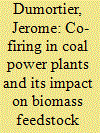| Srl | Item |
| 1 |
ID:
124333


|
|
|
|
|
| Summary/Abstract |
Several states have a renewable portfolio standard (RPS) and allow for biomass co-firing to meet the RPS requirements. In addition, a federal renewable fuel standard (RFS) mandates an increase in cellulosic ethanol production over the next decade. This paper quantifies the effects on local biomass supply and demand of different co-firing policies imposed on 398 existing coal-fired power plants. Our model indicates which counties are most likely to be able to sustain cellulosic ethanol plants in addition to co-firing electric utilities. The simulation incorporates the county-level biomass market of corn stover, wheat straw, switchgrass, and forest residues as well as endogenous crop prices. Our scenarios indicate that there is sufficient feedstock availability in Southern Minnesota, Iowa, and Central Illinois. Significant supply shortages are observed in Eastern Ohio, Western Pennsylvania, and the tri-state area of Illinois, Indiana, and Kentucky which are characterized by a high density of coal-fired power plants with high energy output.
|
|
|
|
|
|
|
|
|
|
|
|
|
|
|
|
| 2 |
ID:
103629


|
|
|
|
|
| Publication |
2011.
|
| Summary/Abstract |
This study investigates the impacts of high international oil prices on the bioethanol and corn markets in the US. Between 2007 and 2008, the prices of major grain crops had increased sharply, reflecting the rise in international oil prices. These dual price shocks had caused substantial harm to the global economy. Employing a structural vector auto-regression model (SVAR), we analyze how increases in international oil prices could impact the prices of and demand for corn, which is used as a major bioethanol feedstock in the US. The results indicate that an increase in the oil price would increase bioethanol demand for corn and corn prices in the short run and that corn prices would stabilize in the long run as corn exports and feedstock demand for corn decline. Consequently, policies supporting biofuels should encourage the use of bioethanol co-products for feed and the development of marginal land to mitigate increases in the feedstock price.
|
|
|
|
|
|
|
|
|
|
|
|
|
|
|
|
| 3 |
ID:
110570


|
|
|
|
|
| Publication |
2011.
|
| Summary/Abstract |
This study investigates the impacts of high international oil prices on the bioethanol and corn markets in the US. Between 2007 and 2008, the prices of major grain crops had increased sharply, reflecting the rise in international oil prices. These dual price shocks had caused substantial harm to the global economy. Employing a structural vector auto-regression model (SVAR), we analyze how increases in international oil prices could impact the prices of and demand for corn, which is used as a major bioethanol feedstock in the US. The results indicate that an increase in the oil price would increase bioethanol demand for corn and corn prices in the short run and that corn prices would stabilize in the long run as corn exports and feedstock demand for corn decline. Consequently, policies supporting biofuels should encourage the use of bioethanol co-products for feed and the development of marginal land to mitigate increases in the feedstock price.
|
|
|
|
|
|
|
|
|
|
|
|
|
|
|
|